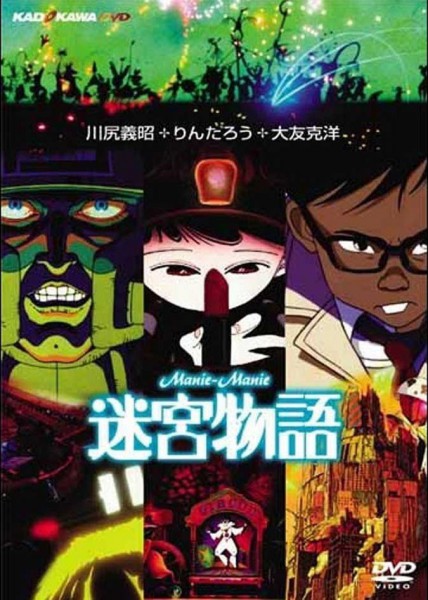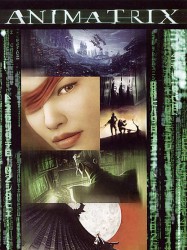Manie Manie est un film de genre Science-fiction réalisé par Yoshiaki Kawajiri sorti en france en DVD le 13 mars 2008 avec Hideko Yoshida
Manie Manie (1989)

Si vous aimez ce film, faites-le savoir !
- Infos
- Casting
- Infos techniques
- Photos
- Vidéos
- Passages TV
- Citations
- Personnages
- Musique
- Récompenses
Sortie en France en DVD 13 mars 2008
Durée 50minutes
Themes Informatique, Magie, Monde imaginaire, Sport, Transport, Automobile, Compétition automobile, Politique, Road movie, Cyberpunk, Dystopique
Note69%










Neo Tokyo (迷宮物語, Meikyū Monogatari, literally "Labyrinth Tales"), also titled Manie-Manie on its title card, is a 1987 anime science fiction anthology film produced by Project Team Argos and Madhouse. Conceived and produced by Madhouse founders Masao Maruyama and Rintaro, it adapts short stories by Taku Mayumura featured in the 1986 collection of the same Japanese title and is executive produced by publisher Haruki Kadokawa.
The 50 minute-long film has three segments, each under a different screenwriter and film director: Rintaro's "Labyrinth labyrinthos," an exploration into the maze of a little girl's mind, Yoshiaki Kawajiri's "Running Man," focusing on a deadly auto race, and Katsuhiro Ōtomo's "Construction Cancellation Order," a cautionary tale about man's dependency on technology. In addition to original music by Godiego's Mickie Yoshino, two prominently feature famous pieces of Western classical music: the first of Erik Satie's Gymnopédies and the "Toreador Song" of Georges Bizet's Carmen in "Labyrinth" and "Morning Mood" from Edvard Grieg's Peer Gynt score, in an ironic manner, in "The Order."
The film premièred on September 25, 1987, at that year's Tōkyō International Fantastic Film Festival. Other than festival screenings, distributor the Tōhō Company originally relegated the film direct-to-video, releasing a VHS on October 10, 1987, but did eventually give it a general cinema release in Japan, on April 15, 1989. In English, the film was licensed, dubbed and released theatrically (as a double feature with the first Silent Möbius film) and to VHS in North America by Streamline Pictures, the license later being taken up by the now also out of business ADV Films.
Synopsis
Trois courts métrages réalisés par ces mêmes noms qui ont apporté Metropolis, Ninja Scroll, et Akira. Tout commence avec "Labyrinth", l'histoire d'un labyrinthe dans l'esprit d'un enfant, réalisé par Rintaro. Ensuite Yoshiaki Kawajiri nous donne «Le courreur». Il s'agit d'une course de formule futuriste on est mis sur une piste mortelle. Enfin Katsuhiro Otomo décrit une lutte pour arrêter une installation entièrement automatisée dans «Stoppez le travail».Acteurs

Hideko Yoshida
(Shojo Sachi (segment "Labyrinth Labyrinthos") (voice))

Masane Tsukayama
(Bob Stone (segment "Running Man") (voice))

Kazumi Tanaka

Yū Mizushima
(Sugioka Tsutomu (segment "Kôji chûshi meirei"))

Hiroshi Ōtake
(Robot 444 (segment "Construction Cancellation Order") (voice))
Commentaires
Postez un commentaire :
Suggestions de films similaires à Manie Manie
Il y a 25 films ayant les mêmes acteurs, 20 films avec le même réalisateur, 26213 ayant les mêmes genres cinématographiques (dont 10 ayant exactement les mêmes 5 genres que Manie Manie), 18506 films qui ont les mêmes thèmes (dont 0 films qui ont les mêmes 11 thèmes que Manie Manie), pour avoir au final 70 suggestions de films similaires.Si vous avez aimé Manie Manie, vous aimerez sûrement les films similaires suivants :

Steamboy (2004)
, 2h10Réalisé par Katsuhiro Ōtomo
Origine Japon
Genres Science-fiction, Fantasy, Animation
Thèmes Informatique, Transport, Le train, Politique, Cyberpunk, Dystopique, Steampunk, Uchronie
Acteurs Anne Suzuki, Manami Konishi, Katsuo Nakamura, Masane Tsukayama, Kiyoshi Kodama, Ikki Sawamura
Note68%





Dans une Angleterre uchronique, au XIX siècle, Ray Steam est le fils de Edward et petit-fils de Lloyd, deux scientifiques inventeurs de machines à vapeur. Ils ne sont pas réapparus depuis plusieurs mois après leur départ pour l'Amérique, lorsqu'un colis contenant une boule métallique (la steamball) parvient au domicile de Ray et sa mère. Mais, deux hommes de la Fondation O'Hara qui financent les recherches des deux paternels, veulent s'en emparer. Ray fuit et est secouru par le scientifique Stevenson, fervent patriote.

Akira (1988)
, 2h4Réalisé par Takashi Nakamura, Katsuhiro Ōtomo
Origine Japon
Genres Science-fiction, Action, Animation
Thèmes Informatique, La mer, Film post-apocalyptique, Religion, Transport, Motocyclette, Le futur, Politique, Road movie, Cyberpunk, Dystopique, Film catastrophe
Acteurs Mitsuo Iwata, Nozomu Sasaki, Mami Koyama, Tesshō Genda, Tarō Ishida, Hiroshi Ōtake
Note79%





Le 16 juillet 1988, Tokyo est détruite. Trente-et-un ans plus tard, après la Troisième Guerre mondiale, en 2019, Neo-Tokyo est une mégalopole corrompue et sillonnée par des bandes de jeunes motards désœuvrés et drogués. Une nuit, l'un d'eux, Tetsuo, a un accident en essayant d'éviter ce qui semble être d'abord un jeune garçon mais qui a un visage de vieillard. Il est capturé par l'armée et fait l'objet de nombreux tests dans le cadre d'un projet militaire secret visant à repérer et à former des êtres possédant des prédispositions à des pouvoirs psychiques (télépathie, téléportation, télékinésie…).

Vampire Hunter D: Bloodlust (2000)
, 1h45Réalisé par Yoshiaki Kawajiri
Origine Japon
Genres Science-fiction, Fantastique, Fantasy, Action, Aventure, Horreur, Animation, Western
Thèmes Mise en scène d'un animal, Magie, Film post-apocalyptique, Religion, Le futur, Mise en scène d'un loup, Dracula, Loup-garou, Vampire, Politique, Dystopique, Mise en scène d'un mammifère, Film catastrophe
Acteurs Pamela Adlon, John DiMaggio, Dwight Schultz, Andy Philpot, Wendee Lee, Michael McShane
Note75%





Dans un futur lointain, la Terre est encore dominée par les vampires, même si leur nombre est en constante diminution. Un nouveau type de chasseur est apparu, les chasseurs de vampires.

Animatrix (2003)
, 1h29Réalisé par Kōji Morimoto, Shin'ichirō Watanabe, Yoshiaki Kawajiri, Mahiro Maeda, Peter Chung, Takeshi Koike
Origine Etats-Unis
Genres Science-fiction, Animation
Thèmes Esclavagisme, Informatique, Philosophie, Film post-apocalyptique, Religion, Sport, Transport, Aviation, Le futur, Arts martiaux, Politique, Cyberpunk, Dystopique, Mise en scène d'un robot, Film catastrophe
Acteurs Hedy Burress, James Arnold Taylor, Clayton Watson, Kevin Michael Richardson, Pamela Adlon, Melinda Clarke
Note73%





Ce programme de neuf courts métrages faisant appel à diverses techniques d'animation (animation classique, manga, images de synthèse...), raconte plusieurs histoires au sein du monde de la Matrice autour de la guerre hommes/machines. 1 - Le Vol de l'Osiris 2 - La Seconde Renaissance, partie 1 3 - La Seconde Renaissance, partie 2 4 - L'Histoire de Kid 5 - Programme 6 - Record du monde 7 - Au-delà 8 - Une histoire de détective 9 - Matricule

Memories (1995)
, 1h53Réalisé par Kōji Morimoto, Tensai Okamura, Katsuhiro Ōtomo
Origine Japon
Genres Science-fiction, Fantasy, Action, Aventure, Animation
Thèmes La mer, Transport
Acteurs Hideyuki Hori, Hisao Egawa, Shigeru Chiba, Tsutomu Isobe, Michio Hazama, Kenichi Ogata
Note74%





Une équipe de cosmonautes chargée de « nettoyer » les débris flottants dans l'espace reçoit un appel à l'aide en provenance d'une station spatiale a priori inhabitée. Ils y découvrent une intelligence artificielle tourmentée…

Ninja Scroll (1993)
, 1h32Réalisé par Yoshiaki Kawajiri
Origine Japon
Genres Fantasy, Action, Aventure, Animation
Thèmes La mer, Sport, Transport, Arts martiaux, Samouraï
Acteurs Kōichi Yamadera, Takeshi Aono, Daisuke Gōri, Emi Shinohara, Shūichirō Moriyama, Norio Wakamoto
Note77%





Un village est ravagé par une épidémie de peste. La kunoichi Kagero accompagne une troupe de ninjas envoyée sur place pour enquêter mais rapidement exterminée par Tessaï, un des huit démons de Kimon. Kagero est sauvée in extremis de la mort par l’intervention de Jubei Kibagami. Ce dernier, rônin solitaire, est contraint par Dakuan, un agent du gouvernement, de combattre chacun des huit démons de Kimon avec l’aide de Kagero. Jubei réalise progressivement que leur chef n’est autre que son pire ennemi, Himuro Genma qui a pour dessein de prendre le pouvoir au Japon.
 , 1h26
, 1h26Réalisé par Yoshiaki Kawajiri
Origine Japon
Genres Science-fiction, Fantasy, Action, Animation
Thèmes Afrique post-coloniale, Film post-apocalyptique, Religion, Voyage dans le temps, Le futur, Politique, Dystopique, Film catastrophe
Acteurs Alistair Abell, Shun Oguri, Scott McNeil, Nolan North, Janyse Jaud, Romi Park
Note67%





En 125 av. J.-C., Colin MacLeod vit paisiblement en Grande-Bretagne lorsque son village est attaqué par des troupes Romaines. Le Général de l'armée romaine, Marcus Octavius, assassine la femme de Colin avant de laisser ce dernier pour mort. Mais Colin se réveille peu après, toujours vivant et entièrement guéri...

Metropolis (2001)
, 1h47Réalisé par Rintarō
Genres Drame, Science-fiction, Animation
Thèmes Informatique, Le futur, Politique, Cyberpunk, Dystopique, Steampunk, Mise en scène d'un robot
Acteurs Kōsei Tomita, Norio Wakamoto, Tarō Ishida, Takeshi Aono, Norihiro Inoue, Masaru Ikeda
Note71%





À Metropolis, une cité futuriste, humains et robots cohabitent, mais vivent dans des espaces bien délimités. Dans une atmosphère baignée par la musique de jazz, cette cité est le théâtre d'une enquête de police menée par un inspecteur japonais et son jeune neveu, Kenichi, au sujet d'un savant accusé de trafic d'organes, le docteur Laughton, qui est au service de l'homme le plus puissant de la ville. Celui-ci utilise les services du savant pour créer un robot ultra-moderne, ayant l'apparence de sa défunte fille, Tima. Ce robot est la clé d'une arme secrète destinée à lui assurer la domination du monde, la Ziggurat, une haute tour à l'image de la tour de Babel, conçue pour égaler Dieu.

L'Épée de Kamui (1985)
Réalisé par Rintarō
Genres Action, Aventure, Animation
Thèmes Sport, Arts martiaux
Acteurs Hiroyuki Sanada, Yuriko Yamamoto, Tarō Ishida, Kaneto Shiozawa, Ichirō Nagai, Kazuyuki Sogabe
Note68%





Au Japon, vers le XIX siècle, Jirô, un jeune garçon accusé de meurtre, s’enfuit dans les montagnes. Tenkai, un moine bouddhiste vient à sa rencontre, et décide de l’initier à l’art du combat. Il deviendra son protecteur. Ninja accompli, Jirô découvre que son sabre détient un précieux secret qui pourrait le conduire à un trésor inestimable et très convoité…

SF shinseiki Lensman (1984)
, 1h47Réalisé par Yoshiaki Kawajiri
Origine Etats-Unis
Genres Science-fiction, Action, Animation
Thèmes Féminisme, Politique, Space opera
Acteurs Steve Kramer, Nachi Nozawa, Michael McConnohie, Chikao Ōtsuka, Edie Mirman, Kerrigan Mahan
Note63%





The story is about a dying Lensman who transfers his Lens to a young man named Kimball Kinnison. To his best knowledge, Kim wasn't aware of how big the responsibility of holding the Lens is. This Lens contains vital information that would enable the Galactic Patrol to face the deadly DNA weapon created by the Boskone Empire. The Arisians initially were the ones who created the Lens in order to stand up to the evil Eddorians, because in spite of their great power, they alone could not vanquish the Eddorian menace. Through the Lens, the Lensmen minds were merged with the cosmic conscientiousness of Arisia. On another side is Lord Helmuth, the ruthless, merciless Boskone leader, who would stop at nothing to get his hands on the Lens.
 Connexion
Connexion